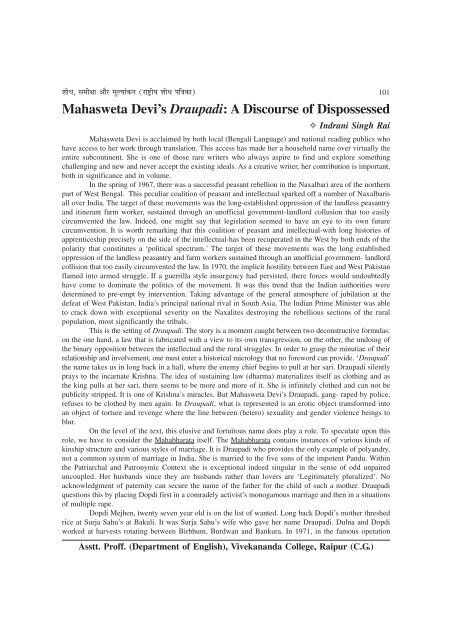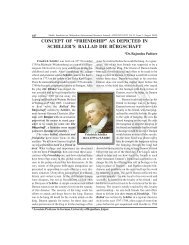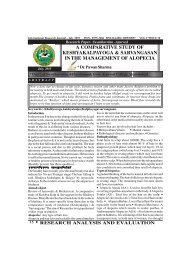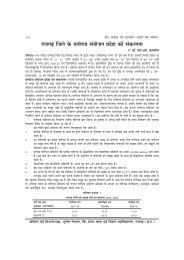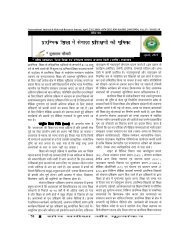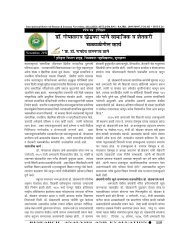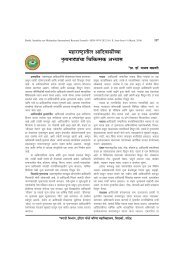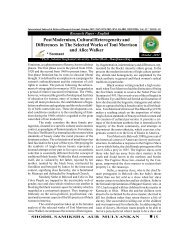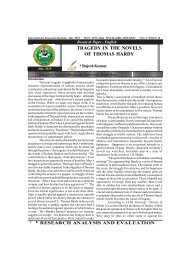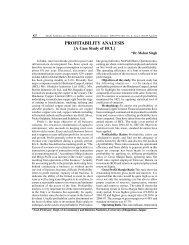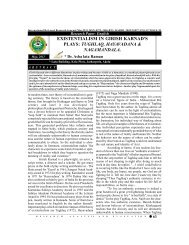Mahasweta Devi's Draupadi: A Discourse of Dispossessed
Mahasweta Devi's Draupadi: A Discourse of Dispossessed
Mahasweta Devi's Draupadi: A Discourse of Dispossessed
Create successful ePaper yourself
Turn your PDF publications into a flip-book with our unique Google optimized e-Paper software.
‡ÊÊappleœ, ‚◊ˡÊÊ •ÊÒ⁄U ◊ÍÀÿÊ¢∑§Ÿ (⁄UÊCÔ˛UËÿ ‡ÊÊappleœ ¬ÁòÊ∑§Ê) 101<br />
<strong>Mahasweta</strong> Devi’s <strong>Draupadi</strong>: A <strong>Discourse</strong> <strong>of</strong> <strong>Dispossessed</strong><br />
Indrani Singh Rai<br />
<strong>Mahasweta</strong> Devi is acclaimed by both local (Bengali Language) and national reading publics who<br />
have access to her work through translation. This access has made her a household name over virtually the<br />
entire subcontinent. She is one <strong>of</strong> those rare writers who always aspire to find and explore something<br />
challenging and new and never accept the existing ideals. As a creative writer, her contribution is important,<br />
both in significance and in volume.<br />
In the spring <strong>of</strong> 1967, there was a successful peasant rebellion in the Naxalbari area <strong>of</strong> the northern<br />
part <strong>of</strong> West Bengal. This peculiar coalition <strong>of</strong> peasant and intellectual sparked <strong>of</strong>f a number <strong>of</strong> Naxalbaris<br />
all over India. The target <strong>of</strong> these movements was the long-established oppression <strong>of</strong> the landless peasantry<br />
and itinerant farm worker, sustained through an un<strong>of</strong>ficial government-landlord collusion that too easily<br />
circumvented the law. Indeed, one might say that legislation seemed to have an eye to its own future<br />
circumvention. It is worth remarking that this coalition <strong>of</strong> peasant and intellectual-with long histories <strong>of</strong><br />
apprenticeship precisely on the side <strong>of</strong> the intellectual-has been recuperated in the West by both ends <strong>of</strong> the<br />
polarity that constitutes a ‘political spectrum.’ The target <strong>of</strong> these movements was the long established<br />
oppression <strong>of</strong> the landless peasantry and farm workers sustained through an un<strong>of</strong>ficial government- landlord<br />
collision that too easily circumvented the law. In 1970, the implicit hostility between East and West Pakistan<br />
flamed into armed struggle. If a guerrilla style insurgency had persisted, there forces would undoubtedly<br />
have come to dominate the politics <strong>of</strong> the movement. It was this trend that the Indian authorities were<br />
determined to pre-empt by intervention. Taking advantage <strong>of</strong> the general atmosphere <strong>of</strong> jubilation at the<br />
defeat <strong>of</strong> West Pakistan, India’s principal national rival in South Asia, The Indian Prime Minister was able<br />
to crack down with exceptional severity on the Naxalites destroying the rebellious sections <strong>of</strong> the rural<br />
population, most significantly the tribals.<br />
This is the setting <strong>of</strong> <strong>Draupadi</strong>. The story is a moment caught between two deconstructive formulas:<br />
on the one hand, a law that is fabricated with a view to its own transgression, on the other, the undoing <strong>of</strong><br />
the binary opposition between the intellectual and the rural struggles. In order to grasp the minutiae <strong>of</strong> their<br />
relationship and involvement, one must enter a historical micrology that no foreword can provide. ‘<strong>Draupadi</strong>’<br />
the name takes us in long back in a hall, where the enemy chief begins to pull at her sari. <strong>Draupadi</strong> silently<br />
prays to the incarnate Krishna. The idea <strong>of</strong> sustaining law (dharma) materializes itself as clothing and as<br />
the king pulls at her sari, there seems to be more and more <strong>of</strong> it. She is infinitely clothed and can not be<br />
publicity stripped. It is one <strong>of</strong> Krishna’s miracles. But <strong>Mahasweta</strong> Devi’s <strong>Draupadi</strong>, gang- raped by police,<br />
refuses to be clothed by men again. In <strong>Draupadi</strong>, what is represented is an erotic object transformed into<br />
an object <strong>of</strong> torture and revenge where the line between (hetero) sexuality and gender violence beings to<br />
blur.<br />
On the level <strong>of</strong> the text, this elusive and fortuitous name does play a role. To speculate upon this<br />
role, we have to consider the Mahabharata itself. The Mahabharata contains instances <strong>of</strong> various kinds <strong>of</strong><br />
kinship structure and various styles <strong>of</strong> marriage. It is <strong>Draupadi</strong> who provides the only example <strong>of</strong> polyandry,<br />
not a common system <strong>of</strong> marriage in India. She is married to the five sons <strong>of</strong> the impotent Pandu. Within<br />
the Patriarchal and Patronymic Context she is exceptional indeed singular in the sense <strong>of</strong> odd unpaired<br />
uncoupled. Her husbands since they are husbands rather than lovers are ‘Legitimately pluralized’. No<br />
acknowledgment <strong>of</strong> paternity can secure the name <strong>of</strong> the father for the child <strong>of</strong> such a mother. <strong>Draupadi</strong><br />
questions this by placing Dopdi first in a comradely activist’s monogamous marriage and then in a situations<br />
<strong>of</strong> multiple rape.<br />
Dopdi Mejhen, twenty seven year old is on the list <strong>of</strong> wanted. Long back Dopdi’s mother threshed<br />
rice at Surja Sahu’s at Bakuli. It was Surja Sahu’s wife who gave her name <strong>Draupadi</strong>. Dulna and Dopdi<br />
worked at harvests rotating between Birbhum, Burdwan and Bankura. In 1971, in the famous operation<br />
Asstt. Pr<strong>of</strong>f. (Department <strong>of</strong> English), Vivekananda College, Raipur (C.G.)
102 ‡ÊÊappleœ, ‚◊ˡÊÊ •ÊÒ⁄U ◊ÍÀÿÊ¢∑§Ÿ (⁄UÊCÔ˛UËÿ ‡ÊÊappleœ ¬ÁòÊ∑§Ê)<br />
Bakuli, when three villages were cordonned <strong>of</strong>f and gunned down, they too lay on the ground, faking deed.<br />
In fact they were the main culprits. In all this they were the chief instigators. Dulna and Dopdi went<br />
underground for a long time. The Special Forces attempted to find them out. Therefore they are on the list<br />
<strong>of</strong> wanted.<br />
Guerilla Warfare is supposed to be the most despicable and repulsive style <strong>of</strong> fighting with primitive<br />
weapons. Annihilation at sight <strong>of</strong> any and all practitioners <strong>of</strong> such water is the sacred duty <strong>of</strong> every soldier.<br />
Dopdi and Dulna belong to the category <strong>of</strong> such fighters, for they too killed with hatchets and scythes, bows<br />
and arrows. Mr. Senanayak, who is sent to catch Dulna and Dopdi, is not to be trifled with. Whatever his<br />
‘practice’ in ‘theory’ he respects the opposition.<br />
In fact, he knows that, as in the old popular song, turn by turn the would will change. And<br />
in every world he must have the credentials to survive with honour. If necessary he will show<br />
the future to what extend he alone understands the matter in its proper perspective. He knows<br />
very well that what he is doing today the future will forget, but he also knows that if he can<br />
change colour form world to world, he can represent the particular world in question. Today<br />
he is getting rid <strong>of</strong> the young by means <strong>of</strong> ‘apprehension and elimination’, but he knows people<br />
will soon forget the memory and the lessons <strong>of</strong> blood. (Breast Stories 23)<br />
After escaping from Bakuli, Dopdi and Dulna have worked at the house <strong>of</strong> virtually every landowner;<br />
they can efficiently inform the killers about their targets and announce proudly that they too are soldiers.<br />
Finally the impenetrable forest <strong>of</strong> Jharkhani in surrounded by real soldiers, the army enters and splits the<br />
battlefield. Soldiers in hiding guard the falls and springs that are the only source <strong>of</strong> drinking water. On one<br />
such search, army informant Dukhiram Gharai sees a young santhal man lying on his stomach on a flat<br />
stone, dipping his face to drink water. The soldiers shoot him as he lays drinking water. They realized later<br />
that it was the redoubtable Dulna Majhi. Dopdi loved Dulna more than her blood. No doubt it is she who is<br />
saving the fugitives now. But the search for Dopdi continues. In the forest belt <strong>of</strong> Jharkhani, the ‘operation’<br />
continuous- will continue. Dopdi knows, has learned by hearing so <strong>of</strong>ten and so long, how one can come to<br />
terms with torture.<br />
If mind and body give way under torture, Dopdi will bite <strong>of</strong>f her tongue. That boy did it.<br />
They kountered him. When they kounter you your hands are tied behind you. All your bones<br />
are crushed; your sex is a terrible wound. Killed by police in an encounter… unknown male…<br />
age twenty- two. (Breast Stories 28)<br />
Dopdi and Dulna would work around the Jharkhani belt. Dulna had explained to Dopdi “Dear this<br />
is best! We won’t get family and children this way. But who knows? Landowner and moneylender and<br />
policeman might one day be wiped out!” (Breast Stories 30)<br />
But <strong>Draupadi</strong> Mejhen got apprehended. She was sent to ‘camp’. She was interrogated for about an<br />
hour, but no one touched her, and she was allowed to sit on a canvas camp stool. At 8.57 Senanayak’s<br />
diner hour approached, and he disappeared saying, “Make her do the needful.”(Breast Stories 34)<br />
Then a billion moons pass. It seems a billion lunar years have passed. Opening her eyes after a<br />
million light years, <strong>Draupadi</strong>, strangely enough, sees sky and moon. Slowly the bloodied nail heads shift<br />
from her brain. She tries to move, but feels her arms and legs still tied to four posts. She is incredibly thirsty.<br />
She senses that her vagina is bleeding. She thinks, “How many came to make her?” Shaming her, a tear<br />
trickles out <strong>of</strong> the corner <strong>of</strong> her eye. In the muddy moonlight she lowers her lightless eye, sees her breasts<br />
and understands, she is made up right. Again she thinks,” Haw many? Four- five- six- seven- then <strong>Draupadi</strong><br />
had passed out.” (Breast Stories 35)<br />
The story <strong>of</strong> Dopdi reminds one <strong>of</strong> <strong>Draupadi</strong> in Mahabharata. The men easily succeed in stripping<br />
Dopdi. It is the culmination <strong>of</strong> her political punishment by the representatives <strong>of</strong> the law. The punishment<br />
seems unending. Dopdi when turns her eyes, she sees her white cloth.<br />
Suddenly she hopes against hope. Perhaps they have abandoned her for the foxes to devour.<br />
But she hears the scrape <strong>of</strong> feet. She turns her head, the guard leans on his bayonet and<br />
leers at her. <strong>Draupadi</strong> closes her eyes. She doesn’t have to wait long. Again the process <strong>of</strong>
‡ÊÊappleœ, ‚◊ˡÊÊ •ÊÒ⁄U ◊ÍÀÿÊ¢∑§Ÿ (⁄UÊCÔ˛UËÿ ‡ÊÊappleœ ¬ÁòÊ∑§Ê) 103<br />
making her begins. Goes on. The moon vomits a bit <strong>of</strong> light and goes to sleep. Only the dark<br />
remains. A compelled spread eagled still body. Active pistons <strong>of</strong> flesh rise and fall, rise and<br />
fall over it. (Breast Stories 35)<br />
Senanayak pushed Dopdi properly in night but he himself is in trouble the next day as Dopdi remains<br />
publicly naked at her own insistence. There is a commotion as if the alarm has sounded in a prison. Senanayak<br />
walks out surprised and sees <strong>Draupadi</strong>, naked, walking toward him in the bright sunlight with her head high.<br />
The nervous guards follow behind. <strong>Draupadi</strong> stands before him, naked. She laughs and says, “The object <strong>of</strong><br />
your search, Dopdi Mejhen you asked them to make me up, don’t you want to see how they made me?<br />
(Breast Stories 36) Senanayak barks, “What is this? Where are her clothes?” (Breast Stories 36) <strong>Draupadi</strong><br />
laughs; her ravaged lips bleed as she begins laughing. She wipes the blood on her palm and says in a voice<br />
that is as terrifying, sky splitting. “What’s the use <strong>of</strong> cloths? You can strip me, but how can you clothe me<br />
again? Are you a man?” (Breast Stories 36) She looks around and chooses the front <strong>of</strong> Senanayak’s white<br />
bush shirt to spit a bloody gob at and says, “There is not a man here that I should be ashamed. I will not let<br />
you put my cloth on me. What more can you do? Come on kounter me- come on kounter me-? (Breast<br />
Stories 37) <strong>Draupadi</strong> pushed Senanayak with her two mangled breasts and for the first time Senanayak is<br />
terrified to stand in front <strong>of</strong> an unarmed ‘target’. Rather than save her modesty through the implicit<br />
intervention <strong>of</strong> a benign and divine comrade, the story insists that this is the place where male leadership<br />
stops.<br />
On the level <strong>of</strong> the plot, Senanayak is the army <strong>of</strong>ficer who captures and degrades <strong>Draupadi</strong>. In<br />
practice, the instruments <strong>of</strong> First-World life and investigation are complicit with such captures and such a<br />
degradation. Author’s careful presentation <strong>of</strong> Senanayak as a pluralist aesthete can be noticed. In theory,<br />
Senanayak can identify with the enemy. Thus his emotions at Dopdi’s capture are mixed: sorrow (theory)<br />
and joy (practice).<br />
As a tribal, Dopdi is not romanticized by <strong>Mahasweta</strong>. Dopdi is not like <strong>Draupadi</strong>- written into the<br />
patriarchal and authoritative sacred text as pro<strong>of</strong> <strong>of</strong> male power. Dopdi is at once a palimpsest and a<br />
contradiction. There is nothing ‘historically implausible’ about Dopdi’s attitudes. She loves her husband<br />
and keeps political faith as an act <strong>of</strong> faith toward him. She adores her forefathers because they protected<br />
their woman’s honour. She crosses the sexual differential into the field <strong>of</strong> what could only happen to a woman.<br />
She emerges as the most powerful ‘subject’ who, still using the language <strong>of</strong> sexual ‘honour’, can derisively<br />
call herself “the object <strong>of</strong> your search” (Breast Stories 36) whom the author can described as a terrifying<br />
superobject- “an unarmed target?” (Breast Stories 37) Of course, this voice <strong>of</strong> male authority also fades.<br />
Once Dopdi enters, in the final section <strong>of</strong> the story, the postscript area <strong>of</strong> lunar flux and sexual difference,<br />
she is in a place where she will finally act for herself in not ‘acting,’ in challenging the man to (en) counter<br />
her as unrecorded or misrecorded objective historical monument. The army <strong>of</strong>ficer is shown as unable to<br />
ask the authoritative ontological question, “What is this?” (Breast Stories 36) In fact, in the sentence<br />
describing Dopdi’s final summons to the sahib’s tent, the agent is missing. An allegory <strong>of</strong> the woman’s<br />
struggle within the revolution in a shifting historical moment can be seen.<br />
Works Cited:<br />
Spivak, Chakravorty Gayatri. Breast Stories. Kolkata: Seagull 2002.


